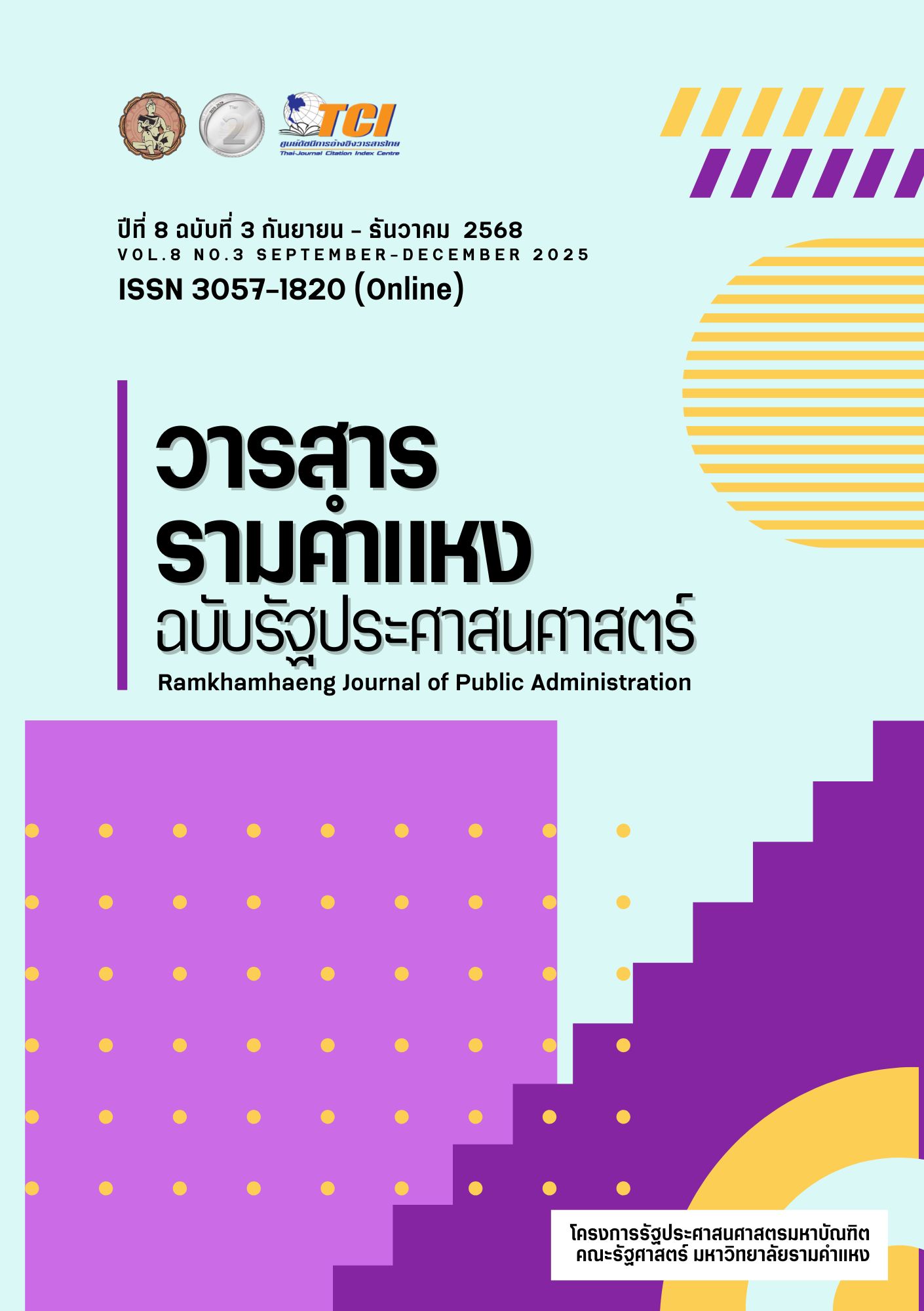Cultural Industry Literacy of Korean Wave of Suan Dusit University Students through Korean Food in Korean Drama Series
Keywords:
Cultural Industry Literacy, Korean Food, Korean Drama SeriesAbstract
The objective of the research “Cultural Industry Literacy of Korean Wave of Suan Dusit University Students through Korean Food in Korean Drama Series” is to analyze the Cultural Industry Literacy of Korean Wave of Suan Dusit University Students through the representation Korean food in Korean Drama Series. The sample group consisted of 50 students from Suan Dusit University who were enrolled in the course "The Value of Happiness" during the first semester of the academic year 2024 (Section G1). The study collected data using rubric-based assessments and content analysis from the reports presented by students. The research methodology is mixed methodology with an audience analysis.
The findings revealed that: 1) The overall score level of cultural industry literacy of the Korean Wave of Suan Dusit University students through Korean food in Korean Drama Series is at a good level. (mean= 84.90, standard deviation= 9.24) 2) Most students demonstrated strong abilities in critical thinking and cultural industry literacy of Korean Wave through Korean food in Korean Drama Series in three key areas: Access, Analyze, and Evaluate. However, the soft power of the Korean Wave, making some groups of students fascinated by the delicious image of Korean food that looks new, strange, delicious, including the gestures of the actors who eat Korean food with sparkling eyes with happiness, can still influence the audience to want to eat Korean food following the Korean drama series.
References
กมลทิพย์ วิจิตรสุนทร. (2542). ปัจจัยที่มีอิทธิพลต่อการดื่มเครื่องดื่มอแลกอฮอล์ของนักเรียนอาชีวศึกษาชายในกรุงเทพมหานคร. วิทยานิพนธ์ปริญญามหาบัณฑิต สาขาวิชาสุขศึกษาและพฤติกรรมศาสตร์ คณะสาธารณสุขศาสตร์ มหาวิทยาลัยมหิดล.
ชุติมา ชุณหกาญจน์. (2550). พฤติกรรมการเลียนแบบวัฒนธรรมของวัยรุ่นไทยจากสื่อบันเทิงเกาหลี. วิทยานิพนธ์ปริญญานิเทศศาสตรมหาบัณฑิต สาขาวิชา นิเทศศาสตรพัฒนาการ คณะนิเทศศาสตร์ จุฬาลงกรณ์มหาวิทยาลัย.
ณิชนันทน์ รุ่งศิริเลิศกุล. (2565). พฤติกรรมการเปิดรับสื่อที่ส่งผลต่อความชื่นชอบอาหารเกาหลีของผู้ชมในเขตกรุงเทพมหานคร. วิทยานิพนธ์ปริญญาศิลปศาสตรมหาบัณฑิต สาขาวิชาการจัดการมรดกวัฒนธรรมและอุตสาหกรรมสร้างสรรค์ วิทยาลัยนวัตกรรม มหาวิทยาลัยธรรมศาสตร์.
ธีรพัฒน์ วงศ์คุ้มสิน. (2562). ทักษะการรู้เท่าทันสื่อ การรู้เท่าทันสื่อ และความฉลาดทางอารมณ์ของนิสิตมหาวิทยาลัยเกษตรศาสตร์. วารสารสังคมศาสตร์และมนุษยศาสตร์, 45(2), 127-161.
นพดล อินทร์จันทร์. (2565). ภาพยนตร์ชุดเกาหลี : กรณีศึกษากระแสคลื่นวัฒนธรรมเกาหลีในสังคมไทย.สืบค้นเมื่อวันที่ 15 มกราคม 2565. จาก https://so02.tci- thaijo.org /index.php/jica/article/download /5767/5051/
นวรัตน์ ชิ้น. (2560). น้ำแข็งไสเกาหลี บิงซู (Bingsu) : ภาพสะท้อนวัฒนธรรมกระแสนิยมอาหารเกาหลีในสังคมไทย กรณีศึกษา ร้านน้ำแข็งไสบิงซูย่านสยามสแควร์. (รายงานการศึกษาเฉพาะบุคคลปริญญาศิลปศาสตรบัณฑิต). มหาวิทยาลัยศิลปากร, คณะโบราณคดี, ภาควิชามานุษยวิทยา.
มุทิตา เอื้องสุภาภรณ์. (2565). อิทธิพลของสื่อบันเทิงเกาหลีที่มีผลต่อการตัดสินใจซื้ออาหารเกาหลีของผู้บริโภคชาวไทย. สารนิพนธ์ปริญญาการจัดการมหาบัณฑิต วิทยาลัยการจัดการ มหาวิทยาลัยมหิดล.
พลอยวไล ทองรักษ์. (2562). การรู้เท่าทันสื่อ แนวทางการรู้เท่าทันและวิเคราะห์สื่อและสุขภาพจิตของนิสิตระดับปริญญาตรีชั้นปีที่ 1 มหาวิทยาลัย เกษตรศาสตร์. วารสารสังคมศาสตร์และมนุษยศาสตร์, 45(1), 200-228.
พัชนียา ชูแสงศรี. (2566). พฤติกรรมการบริโภคอาหารที่ไม่ดีต่อสุขภาพของนักศึกษา มหาวิทยาลัยราชภัฏมหาสารคาม. Journal of Organizational Management Excellence, 1(1), 1-15.
รัศมี อ่อนปรีดา และคณะ. (2567). พฤติกรรมการเลียนแบบทางวัฒนธรรมและการรับวัฒนธรรมสมัยนิยมจากเกาหลีของนักศึกษาไทย. วารสารการบริหารการปกครองและนวัตกรรมท้องถิ่น, 8(2), 1-15. 341-350.
สำนักสุขาภิบาลอาหารและน้ำ. (2565). "ปูไข่ดอง" กินอย่างไรให้ปลอดภัย. สืบค้นเมื่อ 23 มีนาคม 2568 จาก https://foodsan.anamai.moph.go.th/webupload/13x34cba8a8c311038000343e8ab441d5ff/m_magazine/35106/3490/file_download/7698f99435c8fd5c1ba158110aded60c.pdf
อรชพร ปัญจวีณิน. (2562). กระแสเกาหลีที่มีผลกระทบต่อการขยายกิจการร้านอาหารเกาหลีประเภทร้านอาหารปิ้งย่างใน กรุงเทพมหานคร ประเทศไทย. วิทยานิพนธ์ปริญญาศิลปศาสตรมหาบัณฑิต สาขาวิชา เกาหลีศึกษา บัณฑิตวิทยาลัย จุฬาลงกรณ์มหาวิทยาลัย.
Adorno, T. W., & Horkheimer, M. (1992). Dialectics of Enlightenment. (John Cumming, Trans.). London: Verso.
Chanika Siriwat. (2017). Korean Wave and Korean Food Franchise Expansion in Bangkok Thailand [Thesis Master of Arts, Chulalongkorn University]. Chulalongkorn University Intellectual Repository (CUIR). https://doi.org/10.58837/CHULA.THE.2017.1655
Joon-Hwa, Park. (2013). Let's Eat (Season 1. EP.12). CJ ENM Entertainment Division.
Jung-hyo, Lee. (2019). Crash Landing on You (EP.2). Studio Dragon. Netflix. http://www.netflix.com3
Strasburger, V.C, Wilson, B.J., & Jordan, A.B. (2009). Children, Adolescents, And The Media. (2nd ed.). CA :Sage.
Downloads
Published
How to Cite
Issue
Section
Categories
License
Copyright (c) 2025 วิสาขา เทียมลม

This work is licensed under a Creative Commons Attribution-NonCommercial-NoDerivatives 4.0 International License.



